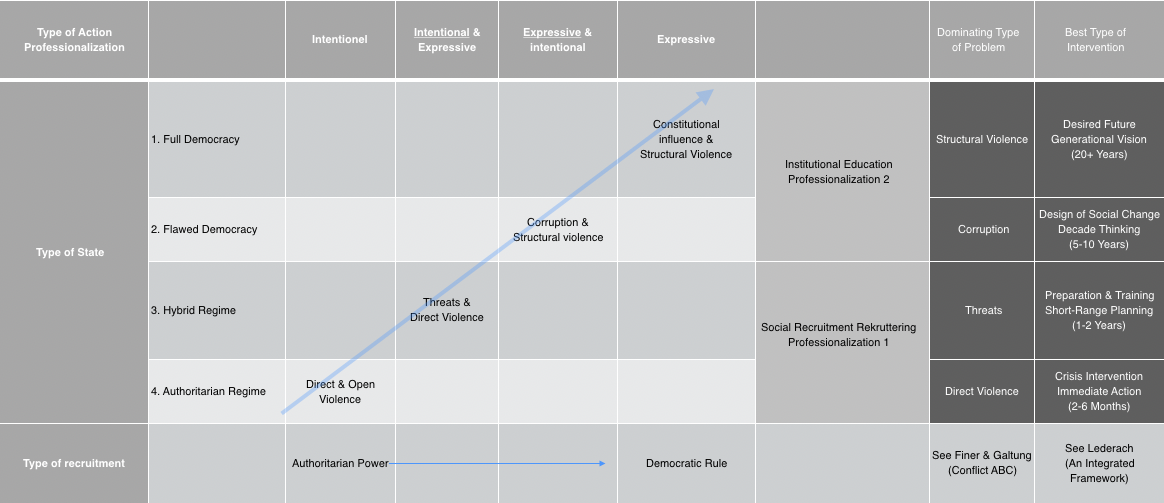On TurningPoints' Work with Law Enforcement Institutions
Assumptions – law enforcement research and interventions
If task description, recruitment, training and organizing of professional law enforcement ’units’ are developed, their socialization into authoritarian and violent ethics, identities, attitudes and behavior – as a group – will change and direct violence will be reduced
Background
Law enforcement institutions are by mandated (elected politicians) or not mandated power holders (dictators) given the task to create and maintain a certain social order. In order to meet this task, law enforcement institutions recruit and organize after known and described historical logics. Both historically and sociologically, it has repeatedly been shown that institutional recruitment change as government change: from a socially narrow recruitment of loyal persons in dictatorship led states to a wide and democratically representative recruitment in states full democracies. These changes result in different ideas and understandings of the task of ’law enforcement’.
Internally law enforcement institutions organize and socialize around the principle of division of tasks and professional skills. Tasks and skills are organized in groups that become the central ’actor’ in law enforcement. In other words it is not the individual person who is in focus when working with institutional law enforcement, rather it is the doctrine, directive, the ’unit’ and ’the profession’ with a certain set of recruited, trained and socialized ethics, identities, attitudes and behavior.
General preconditions
1) Where there is no or low political will, access to police enforcement institutions also become limited. In such circumstances building of trust and relations even with an authoritarian regime becomes necessary and the main purpose as this will open for later research, change and development processes. 2) Two interlinked dimensions of law enforcement are necessary in the development of law enforcement institutions: first – the change of the task from the enforcement of authoritarian rules to the conflict resolution between democratic conflict of interests; and secondly – the change of the attitudes of the profession. 3) The central ‘actor’ of learning is the professional ‘unit’. 3) The learning process must be described, understood and carried out as a professionalization of the police. 5) Central to political will and institutional openness to professionalization is the understanding of the process as a process of demilitarization and de-colonialization of the police. 6) The learning processesmust be directed towards experienced adults working under command under a general doctrine consisting of a number of differentiated directives and in a group with a specific social cohesion – in short: group based inductive learning. 7) As the central objective is the changing of the behaviour of the profession, the learning processes must rest on and be directed towards the practice (tacit behavior, bodily routines) of the professional ‘units’. This means that the profound difference between the rational logic of law discourse and the empirical behavior of practise in law enforcement is realised, understood and overcome by TurningPoints’ staff. 8) It must be realized that a professionalized law enforcement institution cannot function properly (democratically) under the old conditions. This means that organizing, leadership, uniforms, equipment and police stations must also be updated – this is essential. 9) In the process of professionalizing the police, this process mustbe introduced to and open for the public to participate in – so that new ideas, new concepts, new trust, new social capacities and new routinized public-police behavior can be gradually developed. 10) A stabilizing and guiding framework of three vertical cross cutting understandings and co-ordinations as well as an understanding of the differences in terms of actors, behavior and time scopes is necessary in this type of interventions. They are: top level policy (political will)(+25 years); middle range institutional level (4-5 years) and grass root level (0-1 years). 11) It must be realized that parallel investigations to accuse and prosecute as well as scientific dissemination of trusted information in the early phase of the trust building phase probably will jeopardize the process andhinder further access and potential development. 12) Politicians as well as state institutions compare, compete and are therefore interested in each others’ findings and development. Used cleverly, this can be used to build trust. A continuous programme must be put up in which states, institutions and researchers can access new and relevant information for their own development. If the information is presented as constructive democratic learning processes of professional law enforcement institutions in which errors occur this will produce more trust and pave the way for more openness. A first step to build a programme will be to identify 4 states at the 4 different democratically levels: 1) full democracies; 2) flawed democracies; 3) hybrid regimes; and 4 authoritarian states. See illustration below:

Key Engagements
Engaging law enforcement is engaging with an “immense area that can be said to cover the spectrum from life to more-than-life” (Foucault, 2008: 353). It is however the police that produces between 50 and 70 % of violence in the global south according to several surveys. So, the task needs to be prioritized and to be broken down in manageable tasks.
1. Development of a conceptual framework for the work with the practice of professsional law enforcement units (concepts, evidence, experience, recommendations)
First of all TurningPoints needs to develop a conceptual framework of how to engage practically with the police institution. This is so because this work will be adjacent to other TurningPoints' themes, so co-ordination is necessary. Also working with a profession’s socialized practice is different from working with individual learning processes and has to be well thought through and conceptualized.
2. Establishing of an internal multidisciplinary internal work group for the understanding of working with and intervening in the practices of law enforcement personnel. (Concepts, theories, methodologies, data and practices)
To be able to co-ordinate, to work multidisciplinarily and to develop, the different teams need to know deeply each other’s concepts and methodologies. Thus, a work group will be formed. They will work on conceptualizing, theorizing and developing methodologies, regarding law enforcement and prison work.
3. Development of a model (of professional learning processes) for TurningPoint’s intervention practices in the work with the practice of law enforcement personnel (curriculum) – in co-operation with the Nordic Police Schools.
There is a significant need for practical learning models targeting professional law enforcement personnel regarding conflict resolution (task), organization (group processes among professionals) and leadership (power/democracy), which can be tailored to local needs and used in the global south. This model and the tools need to be developed. Part of this work could – to gain practical experience – should take place in co-operation with different Police Academies.
4. Development and testing of capacity building for dialogue
The model for carrying out law enforcement differently needs not only to be addressed the police institution, but needs to be addressed the public as such too. This is however not practically possible, but can be done through a proxy; that is by local NGOs. Part of this work is the development of new concepts, a new ‘language’ which can guide and perhaps carry new ‘practises’ in the meeting between the police and the public. This process can perhaps start creating a new basic trust to central state institutions.
5. Law enforcement as conflict resolution – training the Police for democracy
Central to a change process of professional identity is both the vertical ‘Esprit de Corps’ (task) and the horizontal ‘social cohesion’ (comradeship/organizational culture/routinized behaviour). A model for working with both has to be developed and tested. This can probably be carried out in co-operation with one of the Nordic Police Academies.

